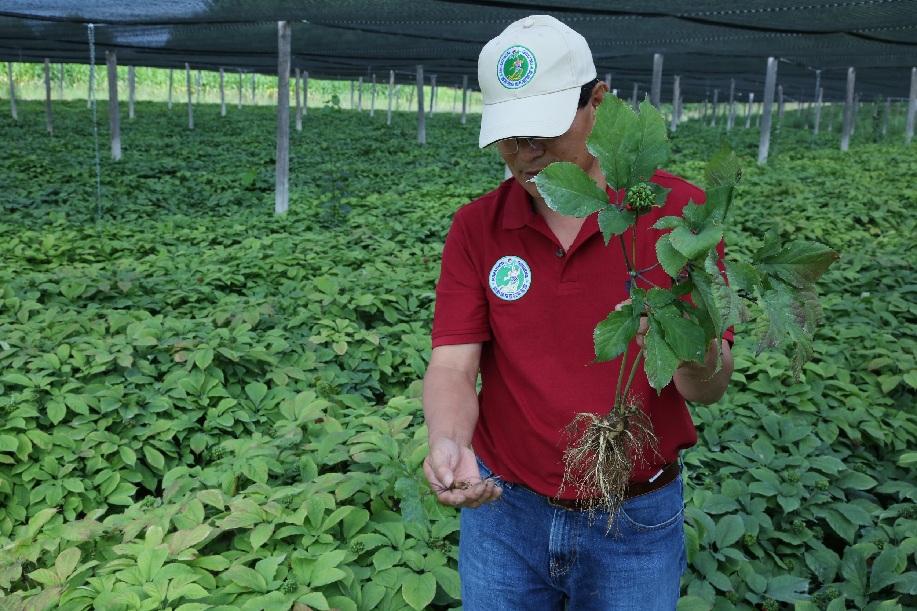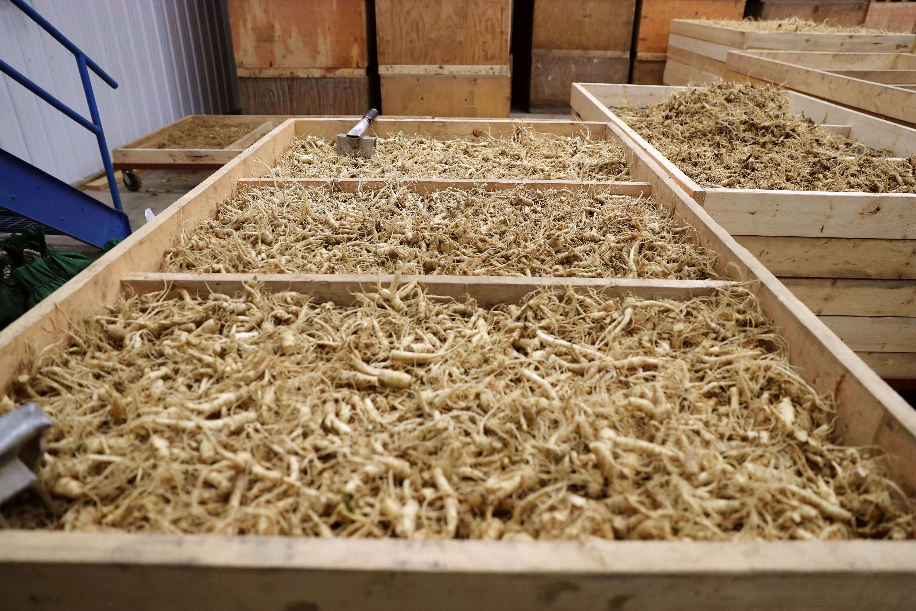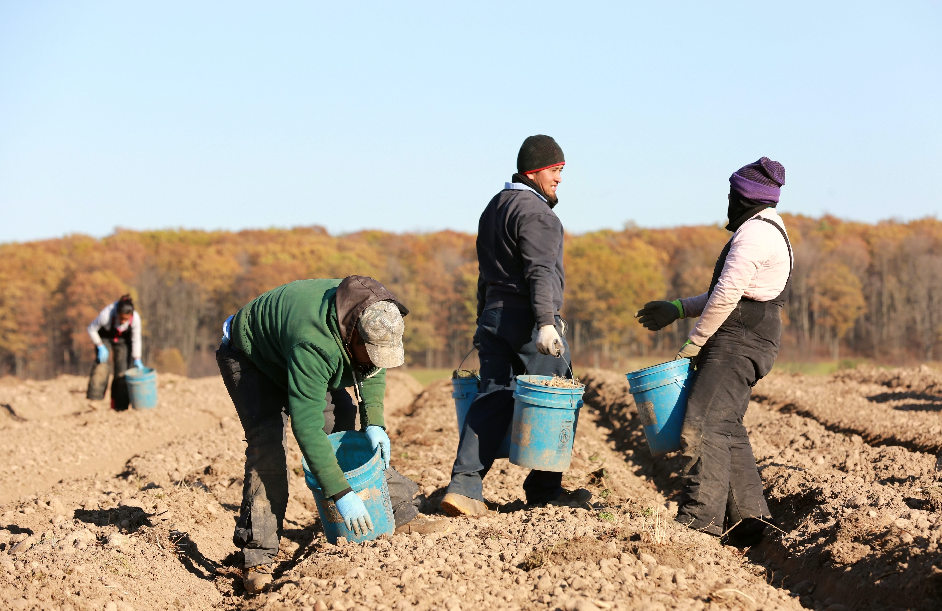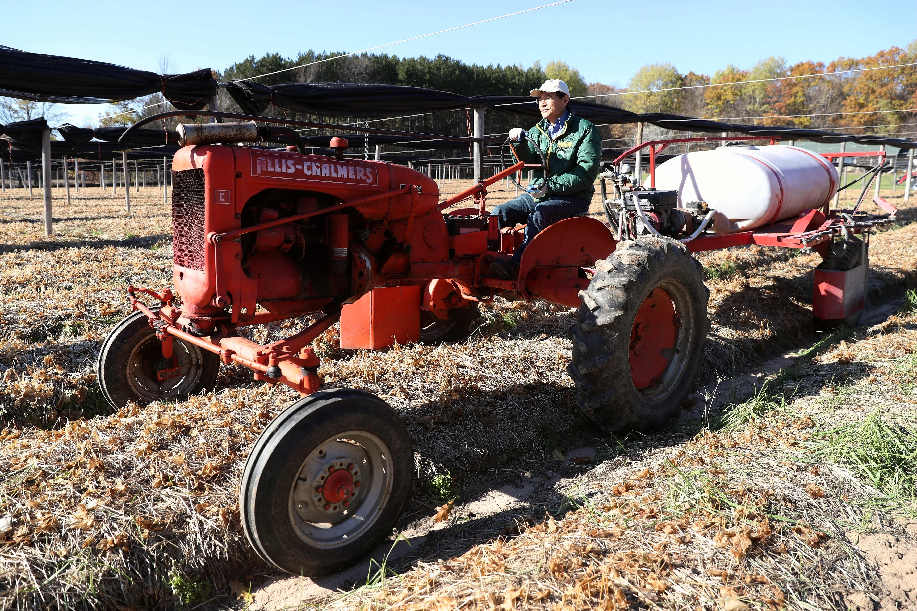
Ginseng grower Jiang Mingtao examines a three-year-old ginseng on his farm in Marathon County, Wisconsin, the United States, Aug. 13, 2019. (Xinhua/Liu Yanan)
The U.S.-China trade frictions have prompted an accumulative 40 percent tariff on Wisconsin ginseng exports.
The businesses of ginseng growers in Marathon County, Wisconsin, may be just another victim in a sea of struggling U.S. firms and farm due to the ongoing trade disputes initiated by Washington against Beijing.
CHICAGO, Aug. 20 (Xinhua) -- Jiang Mingtao, who is standing by his ginseng field, has made a painful decision to keep the crop for one more year.
The business of a ginseng grower in Marathon County, Wisconsin, may be just another victim in a sea of struggling U.S. firms and farm due to the ongoing trade tensions initiated by Washington against Beijing.
In normal years, all ginseng harvested in the previous year sells out by March. It is August now, but half of Wisconsin's ginseng output last year is still in stock while the new harvest season is only six weeks away.
The central-north U.S. state boasts a century-long history of growing ginseng and grows most of the U.S. ginseng crops, contributing 10 percent of the global output. And some 70-80 percent of the annual output were exported to China, where ginseng roots are consumed both as medicine and food.
TARIFFS HURT
The U.S.-China trade frictions have prompted an accumulative 40 percent tariff on Wisconsin ginseng exports. This is a nightmare for Marathon County's 2,000 ginseng producers out of a population of 150,000, and heavily hits the local pillar industry worth 30 million U.S. dollars.

Picture taken on Oct. 22, 2018 shows ginseng dried up in a workplace of Baumann Ginseng company in Marathon County, Wisconsin, the United States. (Xinhua/Wang Ping)
"Some have cut back growing area last year," Jiang told Xinhua. "And we have to assess the market in 3-5 years before working out production plans."
A lot of uncertainties are there. For example, Jiang had thought ginseng seed prices would increase by two to three times after a drought in the spring of 2018 led to a poor harvest. But he was surprised to see no changes.
"This implied less ginseng growing," Jiang said, "I won't be surprised if the growing areas dropped 30-50 percent this year." And he would cut half himself.
"Ginseng farmers live at the mercy of weather, and liquidity matters much," he said. And it seems they have to put new harvest in stock for a second year.
"It will be an unbearable burden," he sighed. He believes few can survive two years of tariff hikes. "Old farmers would give up in the following year if the situation continues."
In fact, many have already shifted to other crops. Local farmers have newly allocated 120 acres of land to growing industrial hemp.
The ginseng plight also weighs on the mind of Brad Karger, Marathon's county administrator.

Local workers dig ginseng at a ginseng farm in Marathon County of Wisconsin state, the United States, on Oct. 22, 2018. (Xinhua/Wang Ping)
"It's been one of the more profitable areas of agriculture and the highest growth," said Karger, with products mostly sold to China and some other Asian destinations.
"And we're now seeing the impact of some of the tariffs and uncertainty with regard to ongoing trade to China," Karger said.
"This can't go on much longer. It's going to ruin the industry here in Marathon County and a lot of good paying jobs and a lot of people who are supporting families on it will be impacted by that," Karger noted.
FREE TRADE INSTEAD OF SUBSIDY
Tim Buttke, vice president of Nicolet National Bank, compared the current situation, from a banker's view, with that during the 2009 financial crisis.
"The difference between 2009 and this one: 2009 was very steep, and then we came back up within a year or so. This one, it's not as deep, but it's been much more persistent," he told Xinhua.
In 2018, the U.S. government offered 25 billion dollars in subsidies to farmers affected by China's retaliatory tariff hikes, but not to the satisfaction of farmers.
Buttke said, "The people that I talked to in Marathon County, they're not interested in government subsidies. They're interested in selling their high-quality product at a fair market rate."

Ginseng grower Jiang Mingtao works with a tractor at a ginseng farm in Marathon County of Wisconsin state, the United States, on Oct. 22, 2018. (Xinhua/Wang Ping)
Jiang has made a calculation and found the subsidy for ginseng growers, at some 5,700 dollars per acre, amounts to a negligible 10 percent of the production cost.
PRESERVING LOCAL GINSENG INDUSTRY
"It (ginseng) brings a huge income to central Wisconsin here ... It is a state crop," Marathon County Board Supervisor Yee Leng Xiong noted.
Karger said the county is making contact with congressional people in order to bring home to them the importance of the local ginseng industry. "We have a lot at risk here. We have to get this tariff issue straightened out."
"You can raise cows and milk anywhere. This is special because of the climate and because of the soil conditions that is conducive to growing the highest quality of Ginseng in the world," he said.
"We've over the years had a good relationship with China and a lot of farmers benefit from trade. We need to trade," said Buttke. "It would be much better if we could come to some agreement and then have a sustainable policy that the producers both in China and here could rely on."



